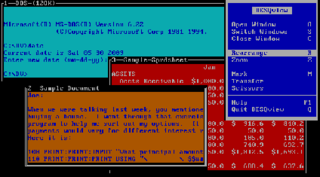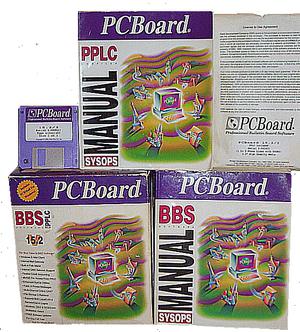
A bulletin board system (BBS), also called a computer bulletin board service (CBBS), is a computer server running software that allows users to connect to the system using a terminal program. Once logged in, the user performs functions such as uploading and downloading software and data, reading news and bulletins, and exchanging messages with other users through public message boards and sometimes via direct chatting. In the early 1980s, message networks such as FidoNet were developed to provide services such as NetMail, which is similar to internet-based email.
FidoNet is a worldwide computer network that is used for communication between bulletin board systems (BBSes). It uses a store-and-forward system to exchange private (email) and public (forum) messages between the BBSes in the network, as well as other files and protocols in some cases.

A Linux distribution is an operating system that includes the Linux kernel for its kernel functionality. Although the name does not imply product distribution per se, a distro, if distributed on its own, is often obtained via a website intended specifically for the purpose. Distros have been designed for a wide variety of systems ranging from personal computers to servers and from embedded devices to supercomputers.
Product activation is a license validation procedure required by some proprietary software programs. Product activation prevents unlimited free use of copied or replicated software. Unactivated software refuses to fully function until it determines whether it is authorized to fully function. Activation allows the software to stop blocking its use. An activation can last "forever", or it can have a time limit, requiring a renewal or re-activation for continued use.

NetWare is a discontinued computer network operating system developed by Novell, Inc. It initially used cooperative multitasking to run various services on a personal computer, using the IPX network protocol. The final update release was version 6.5SP8 in May 2009, and it has since been replaced by Open Enterprise Server.

DESQview (DV) is a text mode multitasking operating environment developed by Quarterdeck Office Systems which enjoyed modest popularity in the late 1980s and early 1990s. Running on top of DOS, it allows users to run multiple programs concurrently in multiple windows.
In a bulletin board system (BBS), a door is an interface between the BBS software and an external application. The term is also used to refer to the external application, a computer program that runs outside of the main bulletin board program. Sometimes called external programs, doors are the most common way to add games, utilities, and other extensions to BBSes. Because BBSes typically depended on the telephone system, BBSes and door programs tended to be local in nature, unlike modern Internet games and applications.
Synchronet is a multiplatform BBS software package, with current ports for Microsoft Windows, Linux, and BSD variants. Past versions also ran on MS-DOS and OS/2, but support for those platforms were dropped in version 3.0.
ISCABBS, also known as ISCA, is a computer bulletin board system ("BBS"), formerly based at the University of Iowa. "Daves' own version of Citadel" (DOC), an early branch of the Citadel/UX BBS software, was developed to run ISCA. Like most Citadels, the focus is almost entirely on conversation among users.

Diversi-Dial, or DDial was an online chat server that was popular during the mid-1980s. It was a specialized type of bulletin board system that allowed all callers to send lines of text to each other in real-time, often operating at 300 baud. In some ways, it was a sociological forerunner to IRC, and was a cheap, local alternative to CompuServe chat, which was expensive and billed by the minute. At its peak, at least 35 major DDial systems existed across the United States, many of them in large cities. During the evening when telephone rates were low, the biggest DDial systems would link together using Telenet or PC Pursuit connections, forming regional chat networks.
The Bread Board System (TBBS) is a multiline MS-DOS based commercial bulletin board system software package written in 1983 by Philip L. Becker. He originally created the software as the result of a poker game with friends that were praising the BBS software created by Ward Christensen. Becker said he could do better and founded eSoft, Inc. in 1984 based on the strength of TBBS sales.

PCBoard (PCB) was a bulletin board system (BBS) application first introduced for DOS in 1983 by Fred Clark's Clark Development Company. PCBoard was one of the first commercial BBS packages for DOS systems, and was considered one of the "high end" packages during the rapid expansion of BBS systems in the early 1990s. PCB was used as the basis of some of the largest bulletin board systems of the era, like Canada Remote Systems.
ARC is a lossless data compression and archival format by System Enhancement Associates (SEA). The file format and the program were both called ARC. The format is known as the subject of controversy in the 1980s, part of important debates over what would later be known as open formats.
CompuServe CB Simulator was the first dedicated online chat service that was widely available to the public. It was developed by a CompuServe executive, Alexander "Sandy" Trevor, and released by CompuServe on February 21, 1980, as the first public, commercial multi-user chat program.
Mac gaming refers to the use of video games on Macintosh personal computers. In the 1990s, Apple computers did not attract the same level of video game development as Microsoft Windows computers due to the high popularity of Windows and, for 3D gaming, Microsoft's DirectX technology. In recent years, the introduction of Mac OS X and support for Intel processors has eased the porting of many games, including 3D games through use of OpenGL, and more recently, Apple's own Metal API API. Virtualization technology and the Boot Camp dual-boot utility also permit the use of Windows and its games on Macintosh computers. Today, a growing number of popular games run natively on macOS, though as of early 2019, a majority still require the use of Microsoft Windows.
Mustang Software, Inc. was a California-based corporation that developed telecommunications software products. Mustang was incorporated in 1988, became a public corporation in 1995, and was finally merged into Quintus Corporation in 2000.
GT Power is a bulletin board system (BBS) and dial-up telecommunications/terminal application for MS-DOS. It was first introduced in the 1980s by P & M Software, founded by Paul Meiners. GT Power can be used both to host a BBS as well as to connect to other BBS systems via its full-featured dial-up "terminal mode". GT Power was a shareware package that required a registration fee in order to access its proprietary network mail transport/handling software and, by default, the GT Power Network. The software is distributed in two "flavors": a terminal-only version, nicknamed GTO, and the full-featured host and terminal version.
StarDoc 134 is a Dos/Linux hybrid BBS running EleBBS maintained by Andrew Baker aka "RamMan, Dotel and Dotelpenguin".

DR-WebSpyder is a DOS web browser, mail client and operating system runtime environment that was developed by Caldera UK in 1997. It was based on the DR-DOS operating system and networking components from Novell as well as the Arachne web browser by Michal Polák of xChaos software. The system was designed to run on low-end desktop systems, but being able to boot and execute from disk as well as from ROM or network, it was also tailored for x86-based thin clients and embedded systems with or without disk drives. Using the web browser as its principal user interface, it could be also used for kiosk systems and set-top boxes. It was ported to Linux in 1999 under the name Embrowser and was renamed Embedix Browser in 2000.






